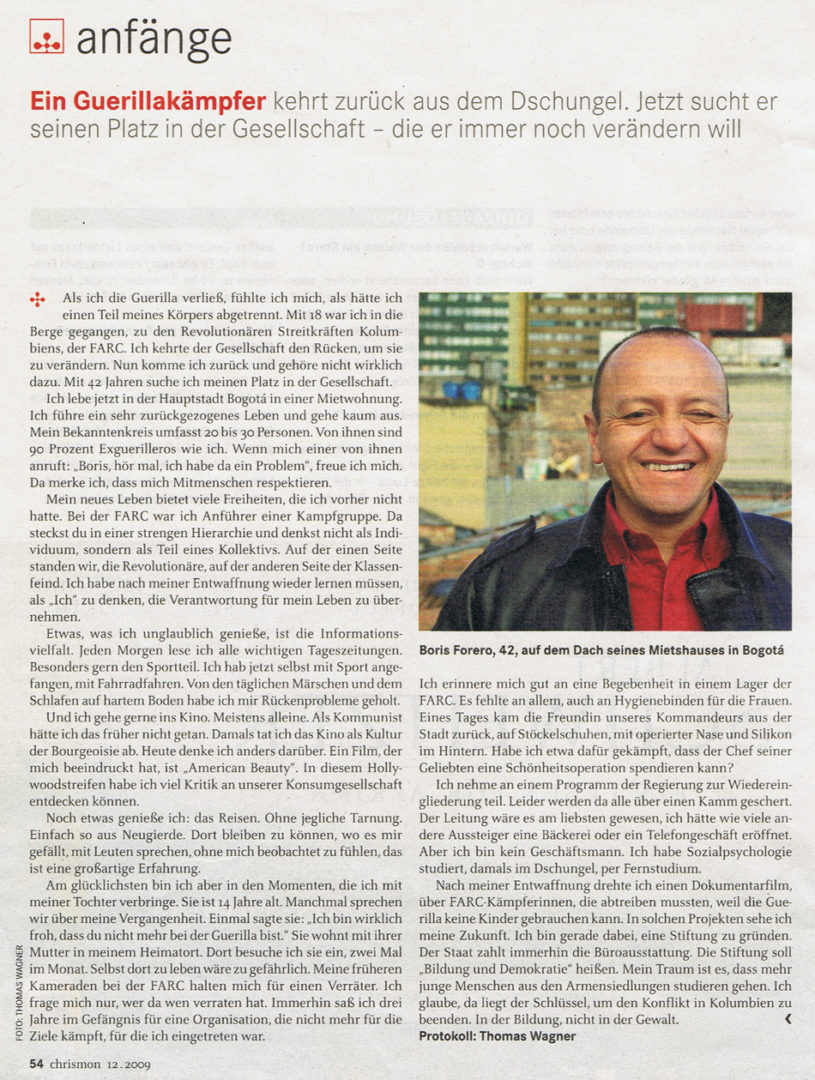Colombia – A new beginning: Boris Forero
The interview with Boris was one of the most emotional I have had in my career. I wish him all the best on his way to become a civilian in Colombian society.




Boris Forero, 42, returns from the jungle. Now he is looking for his place in society – which he still wants to change
When I left the guerrillas, I felt like I had cut off part of my body. When I was 18, I had gone to the mountains, to join the Revolutionary Armed Forces of Colombia, the FARC. I turned my back on society, to change it. Now I’m back and I don’t really belong. At 42 years old, I’m looking for my place in
society.
I now live in the capital Bogotá in a rented apartment. I lead a very secluded life and hardly ever go out. out. My circle of acquaintances comprises 20 to 30 people. Of them, 90 percent are exguerilleros like me. When one of them calls me one of them calls me: “Boris, listen, I’ve got a problem”, I’m delighted. That’s when I realize that people respect me.
My new life gives me a lot of freedom that I didn’t have before. In the FARC, I was the leader of a combat group. You’re part of a strict hierarchy and don’t think as an individual, but as part of a collective.
We, the revolutionaries, were on one side and the class enemy was on the other. After disarmament, I had to learn to think as an “I” again, to take responsibility for my life.
One thing I enjoy incredibly is the diversity of information. I read all the important daily newspapers every morning. Especially the sports section. I’ve now taken up sport myself, cycling. From the daily marches and sleeping on a hard floor have given me back problems.
And I like going to the movies. Mostly on my own. As a communist, I wouldn’t have done that in the past. Back then, I dismissed the cinema as the culture of the bourgeoisie. Today I think differently about it. One movie that made an impression on me is “American Beauty”. In this Hollywood movie, I was able to discover a lot of criticism of our consumer society.
Something else I enjoy: traveling. Without any camouflage. Simply out of curiosity. Being able to stay where I like I like, talking to people without feeling like I’m being watched, that’s a great experience. But I’m happiest in the moments I spend with my daughter. She is 14 years old. Sometimes we talk about my past. Once she said: “I’m really glad you’re no longer with the guerrillas.” She lives with her mother in my home town. I visit her there once or twice a month. Living there myself would be too dangerous. My former comrades in the FARC think I’m a traitor. I just wonder who betrayed who betrayed whom. After all, I spent three years in prison for an organization that no longer fights for the goals, I had stood up for.
I remember one incident in a FARC camp very well. There was a lack of everything, including sanitary towels for the women. women. One day, our commander’s girlfriend came back from the city, wearing high heels, with a nose operation and silicone in her bottom. nose and silicone in her butt. Did I fight for the boss to be able to give his mistress plastic surgery?
I’m taking part in a government reintegration program. Unfortunately, everyone is lumped together. The management would have preferred it if I had opened a bakery or a telephone shop like many other dropouts. But I’m not a businessman. I studied social psychology, back in the jungle, by distance learning.
After I disarmed, I made a documentary about female FARC fighters who had to have abortions because the guerrillas couldn’t use children. I see my future in projects like this. I’m in the process of setting up a foundation. At least the state is paying for the office equipment. The foundation is to be called “Education and Democracy”. My dream is that more young people from the slums will go to university. I think that’s the key, to end the conflict in Colombia. Education, not violence.


